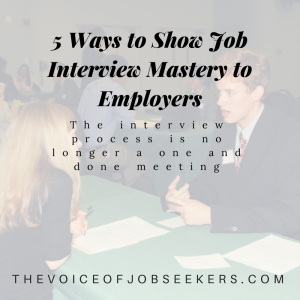|
Getting your Trinity Audio player ready...
|
More than ever, job seekers must be proficient at interviewing. In fact, it’s likely every networking opportunity is an essential job conversation. It may be the interaction to decide your next step, so you want to be interview ready.
The interview process is no longer a one and done meeting. In Lavie Margolin’s latest book, Mastering the Job Interview Process, he states since employers have more applicants than ever. He says companies, “… are maximizing their time by scheduling more interviews online or by phone than they are in person.” It is an “an extra hoop” for job candidates go through, but it is common for professional positions to have a phone interview and a digital assessment before an in-person interview.
It doesn’t have to feel like the Spanish Inquisition. Although these are easier to brace yourself for, the process and mentality are outdated. You’ll be tested and often tried, so you’ll need to be prepared.
To impress hiring decision makers, doing and knowing enough to get by is what your competition is doing. You must be presentation ready at all times and in different ways.
You’re thinking, “All I want is a job!”
You don’t have to say it. It shows. You know nothing about the interviewer, the company, or why you want the job. We can all tell. If you want the competitive edge, but want to know how and why to differentiate yourself, I got you! Here are five reasons and strategies to implement:
Employers want to see your enthusiasm.
Interviewers throw around words indicating they want someone who is “passionate” about the job. In other words, they want job candidates invested in the work. Sort of like dating where if you’re not affectionate, then your heart is questioned.
Solution: Margolin says, “…employers expect the job candidate will do research since the access to research has increased.” You’re not mastering the interview process if you don’t check the company’s website, look at press releases, or know the company’s brand.
Employers want to see you add value.
You got the interview because you will add value. Now you’re competing to show you add the most value. It’s another reason to research, but it’s also time to evaluate your natural strengths and skills and how they match that of the employers.
Solution: You must clarify your value in particular ways with stories and results. Keep a running list of your accomplishments, transferable skills, and how you add value. The more you add to the list and how it applies to each employer you prepare for, the clearer your explanations to employers.
Employers will test you during the job interview.
Some companies will test you through assessments, others will give you case scenarios for you to walk them through your solutions, and others will ask irreverent questions to see how you’ll respond.
Solution:
Margolin suggests taking notes is necessary in most cases to show your interest in what the employer has to tell and show you’re willing to learn.
Employers won’t see fit without personality during your job interview.
The interviewer will likely use their “gut instinct” rather than metrics to discern if you’re a cultural fit for the organization. If he or she does not feel they know the candidate better, the interviewer will choose someone who is more personable and relatable.
Solution: Showing personality is tough for job candidates but as Margolin says the strategy is to “Turn questioning into a conversation. Ask questions during the interviews, not at the end.” I have stated in the past,
Employers want to know that you want the job.
You’re expected to sell yourself somewhat aggressively to show you have the passion for the job and the company. Most people usually undersell themselves even if they promise hard work, diligence, and timeliness.
Solution: Margolin uses the analogy of an advertising company using a billboard approach and how in-your-face creativity doesn’t promote you better. Margolin is right in suggesting over-the-top is not effective (although some have had success). Sprint’s subtle approach in saying there’s only a 1% difference between services, but their price is a profound value proposition. It’s your job to make it your own.
Margolin also suggests the job candidate is responsible for moving the process forward by asking follow-up questions and sending thank-you notes. Most people think when they leave the last interview is the last contact necessary. Create several points of contact, timeline, and clear expectations of what is next for yourself and the employer. Without clarity, you set yourself up to be ignored or insignificant. Neither is good as you will need to ensure a good impression is all an employer experiences with you.
This article was originally published on the Jobs2Careers blog.
About Mark Anthony Dyson
I am the "The Voice of Job Seekers!" I offer compassionate career and job search advice as I hack and re-imagine the job search process. You need to be "the prescription to an employer's job description." You must be solution-oriented and work in positions in companies where you are the remedy. Your job search must be a lifestyle, and your career must be in front of you constantly. You can no longer shed your aspirations at the change seasons. There are strengths you have that need constant use and development. Be sure you sign up to download my E-Book, "421 Modern Job Search Tips 2021!" You can find my career advice and work in media outlets such as Forbes, Inc., Fast Company, Harvard Business Review, Glassdoor, and many other outlets.
